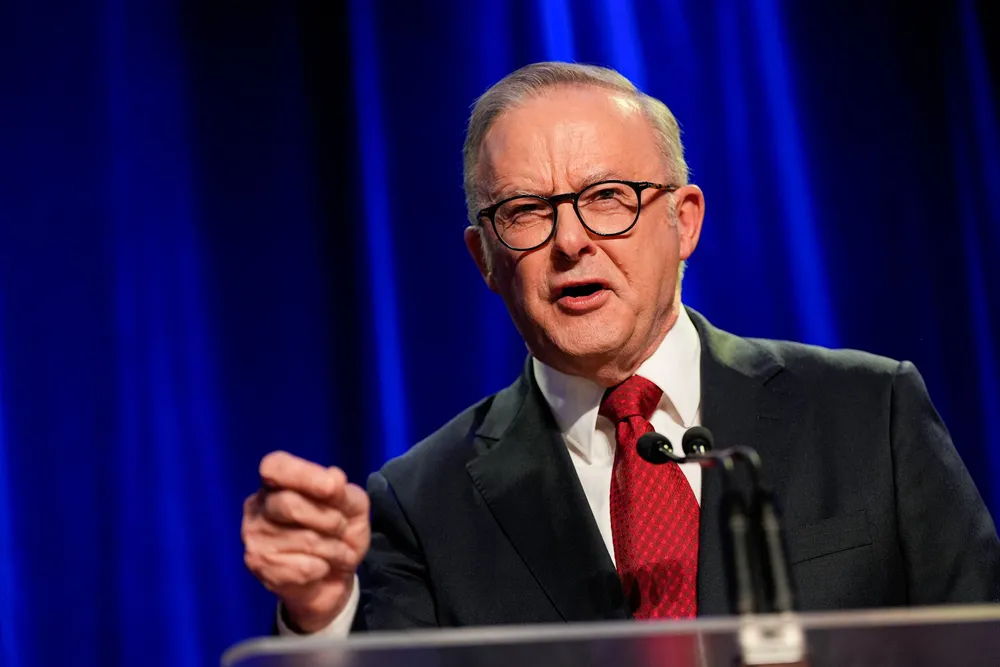Election shadow lifts – but Australian offshore wind still not in clear waters
Developers and investors were ‘cautious in their approach’ to sector amid pledges from opposition leader Dutton to axe offshore wind zones should he win power

Australia’s offshore wind industry can breathe a sigh of relief after the thumping Labor election win over an opposition that had aped Donald Trump in vowing to stop projects in their tracks – although other challenges remain that could yet derail sector ambition.
Such was the gravity of what was at stake in an election that had pitted the staunchly pro-renewables Labor government against an opposition Coalition that wanted to abruptly change course in favour of a massive nuclear power rollout.
The election result sends a “clear message to all, locally and globally, that renewables are the way of the future for Australia," said Evans.
Evans noted that it was the Coalition when they were last in power that introduced legislation launching offshore wind for Australia in 2021, something that he said “undermined” attacks against it by Dutton.
Having worked with the Coalition during his time as CEO of the Star of the South project in the state of Victoria, Evans said he was “baffled why they backtracked on something they openly supported and clearly is positive for Australia.”
“Then again, nothing surprises me about the cheap grab for power they sought.”
Dutton had increasingly adopted Trump-like rhetoric against offshore wind in his election campaign, describing turbines as a “scar on the landscape” and repeating largely evidence-free claims that they threaten whale lives.
Evans said that, “for those of us who have been in the offshore wind industry for over a decade, we have become seasoned to naysayers against the industry,” so Dutton’s comments had “little impact on us.”
More generally, however, Dutton did send “some shockwaves prior to the election” through his comments, said Evans, adding that it is fair to say some developers and investors were “cautious in their approach to offshore wind” pending the result.
For an established offshore wind zone like Gippsland in Victoria, he said there “appeared to be less concern as it would have been crazy to dismantle an industry already employing hundreds of people, directly and indirectly.”
“But for newer zones like Hunter Coast, Illawarra, Southern Ocean and Bunbury, there was some uncertainty as to what may have happened if the Opposition assumed Government.”
Although Dutton has aped Trump's rhetoric on several issues, the US President may have inadvertently had a hand in securing Albanese's re-election. Labor and Canada's left-leaning Liberals, which won re-election in April, both enjoyed surges in support during their election campaigns. The backlash against right-wing Trump-style policies and politicians in those countries has been seen as crucial to those wins, especially in light of the global trade war launched by the US President.
Labor, now set for another three-year term in power, has said Evans “been clear on the goals for the future, and finally it appears there may be a clear runway to continue creating opportunities for a prosperous future.”
“In comparison to other nations,” Evans said Australia is “looking like a very good place to invest in offshore wind.”
Australian offshore wind ‘not in the clear yet’
“The re-election of Albanese and the Labor Party’s new assumed majority in the lower house is good news for renewables in Australia and offshore wind specifically,” said Simon Engfred, lead Asia-Pacific analyst at Aegir Insights.
“However, the Australian offshore wind market is not out in the clear yet,” he warned. “While cancellations might not happen based on political motivation, the declining interest in the remaining declared areas for feasibility licenses could mean that some areas are left without projects after the application process.”
Victoria has blazed a path in offshore wind for the rest of Australia, with dozens of projects bidding into its Gippsland offshore wind zone. This is in no small part because it committed to a UK-style Contracts for Difference (CfD) scheme for projects.
Elsewhere, however, developers are concerned about “the lack of clarity on offtake routes,” said Engfred, as well as “green tape” delaying projects and rising costs.
Bree Miechel, a projects and construction partner at Ashurst in Sydney, said Labor election win is a “significant boost” to Australia's renewable energy sector, including for its nascent offshore wind industry.
“While the Victorian government has committed to developing a comprehensive support package, including a CfD for the first tranche of offshore wind, its constrained budgetary position may present a challenge to it providing the level of assistance necessary to support its ambition.”
“It is hoped, although remains unclear, whether the federal government will provide complementary contributions for capital and financing.”
Jeff Lynn, an Ashurst planning partner in Melbourne, highlighted the economic opportunity presented by offshore wind in the country.
“One of the projects awarded a feasibility licence in Gippsland has the potential to create over 4,700 jobs in Australia over the 40 plus year lifetime of the project. These initiatives not only contribute to the nation's clean energy goals but also support regional economies and workforce development.”
The Labor victory also ensures continuing government support for the present 82% renewables target by 2030, said Lynn.
“In the lead up to the election neither party had announced a new 2035 emissions reduction target under the Paris Agreement. It seems likely that the Labor government will now move to make such an announcement.”
(Copyright)